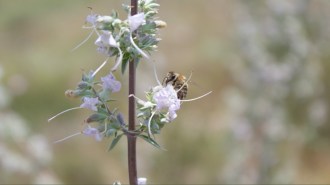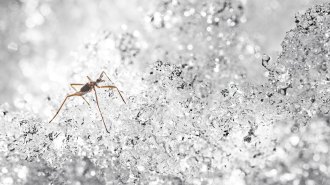News
-
 Astronomy
Astronomy200 years ago, the Milky Way’s central black hole briefly awoke
The black hole is thought to be mostly quiet and dim. Now, glowing cosmic clouds have revealed the behemoth’s last flare.
-
 Life
LifeFlowers pollinated by honeybees make lower-quality seeds
Honeybees are one of the most common pollinators. But their flower-visiting habits make it harder for some plants to produce good seeds.
By Jude Coleman -
 Paleontology
PaleontologyMegalodon sharks may have become megapredators by running hot
O. megalodon sharks were warm-blooded megapredators. But colder-blooded great white sharks may have had an evolutionary edge when food sources dwindled.
-
 Animals
AnimalsA grisly trick helps snow flies survive freezing: self-amputation
When a snow fly’s leg begins to freeze, a quick amputation can prevent ice from spreading, keeping the cold-hardy insect alive.
By Meghan Rosen -
 Physics
PhysicsJulian Muñoz has a ‘ruler’ that could size up the early universe
The measurement tool could lay out a distance scale for cosmic dawn —and offer clues to the nature of dark matter.
-
 Animals
AnimalsBottlenose dolphin moms use baby talk with their calves
When their babies are near, bottlenose dolphin moms modify their signature whistles, similar to human parents speaking in baby talk.
-
 Anthropology
AnthropologyFossil marks suggest hominids butchered one another around 1.45 million years ago
Researchers disagree whether new evidence of stone tool marks on a hominid leg bone reflects ancient cannibalism or perhaps some other, undetected behavior.
By Bruce Bower -
 Life
Life1.6-billion-year-old steroid fossils hint at a lost world of microbial life
Molecular fossils suggest the existence of a lost world of primitive eukaryotes that dominated aquatic ecosystems from at least 1.6 billion to 0.8 billion years ago.
By Soumya Sagar -
 Astronomy
AstronomyA star cluster in the Milky Way appears to be as old as the universe
Globular cluster M92 is about 13.8 billion years old, a new calculation suggests. Getting the age right could help resolve a bigger cosmic conundrum.
-
 Earth
EarthIrrigation may be shifting Earth’s rotational axis
Computer simulations suggest that from 1993 to 2010 irrigation alone could have nudged the North Pole by about 78 centimeters.
By Sid Perkins -
 Genetics
GeneticsThe first gene therapy for muscular dystrophy has been approved for some kids
The U.S. Food and Drug Administration cleared a shortened version of a gene for a muscle protein to be used in 4- and 5-year-olds with muscular dystrophy.
-

The Hunga Tonga eruption sparked the highest-altitude lightning ever recorded
The plume from the 2022 eruption spawned flashes of lightning that started 20 to 30 kilometers above sea level.
By Skyler Ware